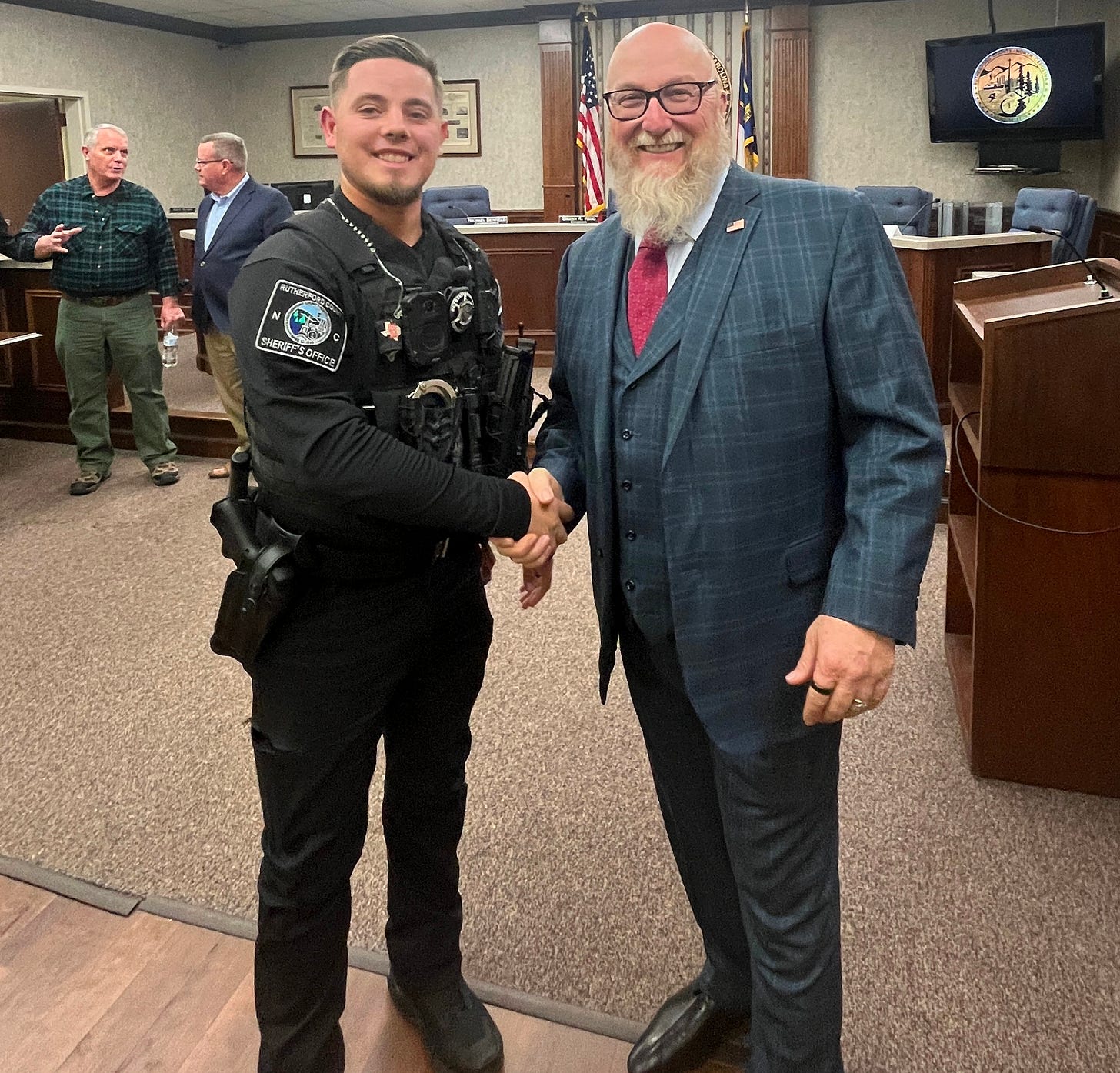To my new subscribers (and a reminder to loyal readers), welcome to Cops & Congress, where facts come first, followed by in-depth commentary and analysis. Paid subscribers enjoy exclusive access to scoops requiring investigation of public records. Your support directly funds the detailed research behind my independent journalism. (ICYMI: Six reasons to support my independent journalism)
Situational awareness: An exclusive, or scoop is an important news story that is first reported by a journalist. This goes beyond breaking news when no other journalists are known to be reporting on an important issue.
Donnie Haulk officially joined the Rutherford County Board of Commissioners Monday evening, taking the oath of office in a ceremony that underscored the changing dynamics of local and state leadership. North Carolina Speaker of the House Tim Moore administered the oath, surrounded by a crowd of supporters and community leaders.
Haulk won the Republican primary earlier this year and was elected without a Democratic challenger in November. He recently faced an election protest, which the state board of election rejected.
Paul Scott, who was recently elected as a state representative, will represent part of Rutherford County in the General Assembly for district 111, succeeding Tim Moore, who has taken on a new role as Congressman for North Carolina’s 14th Congressional District.
During the ceremony, Haulk pledged to uphold the United States and North Carolina constitutions while faithfully serving the residents of Rutherford County. “I’m ready to work alongside my fellow commissioners to ensure that this county thrives,” Haulk said in his remarks.
Speaker Moore praised both Haulk and Scott for their dedication to public service. "Donnie Haulk will bring fresh perspectives to the Board of Commissioners, and I’m confident Paul Scott will excel as a state representative,” Moore said. “These transitions reflect the strength of leadership in Rutherford County.”
Although state representative Jake Johnson, who covers the other part of Rutherford County for district 113, and state senator Tim Moffitt of district 48, were absent from the event, Moore highlighted their ongoing contributions to the region. Also absent was county commissioner Alan Toney. There was not an officially called meeting. County Commissioner Bryan King was there, along with commissioner Michael Benfield and county attorney Richard Williams. Steve Garrison, Rutherford County manager, was also not present for the event.
Haulk expressed enthusiasm for the challenges ahead, with plans to focus on economic development and strengthening the community. He joins newly fellow newly elected county commissioner Hunter Haynes, who was sworn in earlier this month at the December 2 meeting.
The ceremony included a prayer led by Scott and a reception for attendees, celebrating the new chapter in leadership for Rutherford County and its role in shaping the future of North Carolina.

Cops & Congress Commentary: Leadership Shake-Up in Rutherford County and Beyond—3 Things to Watch
With Donnie Haulk sworn in as a Rutherford County commissioner, Paul Scott heading to Raleigh as a newly elected state representative, and Tim Moore transitioning from Speaker of the House to Congressman for North Carolina’s 14th Congressional District, Rutherford County is undergoing a significant leadership shift. These transitions not only reshape local governance but also redefine how our community interfaces with state and federal power structures. Here are three critical things to watch as this new era unfolds:
1. The Balance of Power and Representation
Scott has big shoes to fill as Moore’s successor in the General Assembly, where Moore's decade-long tenure as Speaker gave Rutherford County outsized influence.
Will Scott be able to secure key investments and advocate effectively for rural North Carolina as a freshman lawmaker? Meanwhile, how will Moore’s focus on federal priorities impact his ability to remain connected to local needs? These questions loom large as the county's leadership navigates this realignment.
2. The County's Economic Development Strategy
Haulk has indicated his commitment to economic development as a top priority. But with leadership turnover at the state and federal levels, the county’s strategy will need to align with broader policy agendas. Federal infrastructure funding, state economic incentives, and local initiatives must work in harmony to ensure growth. The shift also raises concerns about continuity. Moore’s tenure as Speaker brought substantial projects to the region.
3. The Future of Public Safety and Community Investment
Leadership transitions often bring shifts in priorities. In recent years, public safety funding and support for first responders have been key focus areas for Rutherford County leaders. As the county faces challenges such as rising crime and the need for better infrastructure to support law enforcement, Haulk's role in shaping the county's budget will be pivotal. I will be closely watching how he votes on future issues, along with Haynes, and the other county commissioners.
At the state level, Scott’s legislative agenda could influence funding for rural law enforcement agencies, school safety initiatives, and emergency services. He told me he will continue to serve as a pastor and as the crisis negotiator for the Rutherford County Sheriff’s Office. And at the federal level, Moore's new role may provide opportunities for grants and federal programs that directly impact Rutherford County. The question is whether these leaders can collaborate across different levels of government to deliver results for the community.
Looking ahead
The leadership shift in Rutherford County and beyond marks a turning point for our community. With Haulk, Haynes, Scott, and Moore taking on new roles, their ability to work together will shape the county’s trajectory for years to come. As residents, we must stay engaged, hold these leaders accountable, and ensure they prioritize the issues that matter most to us: economic development, public safety, and maintaining a strong voice for Rutherford County on the state and national stages.
What are your thoughts on this leadership transition? Are these the priorities you would focus on, or do you see other pressing concerns? Join in the conversation below.
Thank you for reading and watching. Learn more about this newsletter and my background. I am guided by the Society for Professional Journalists Code of Ethics. Follow me on X (Twitter), Facebook, Linkedin, Instagram, TikTok, and YouTube. Send constructive criticism, fan mail and tips with public documents for future stories: CopsandCongress@gmail.com.
(Free subscribers: Upgrade to paid to leave a comment below and don’t miss out on exclusive content.)














Share this post